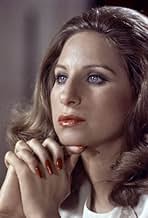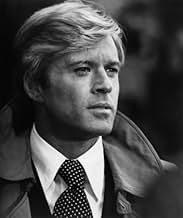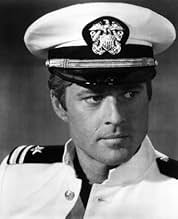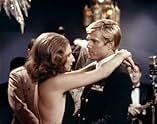NOTE IMDb
7,0/10
29 k
MA NOTE
Deux personnes désespérées vivent une merveilleuse histoire d'amour, mais leurs opinions politiques et leurs convictions les séparent.Deux personnes désespérées vivent une merveilleuse histoire d'amour, mais leurs opinions politiques et leurs convictions les séparent.Deux personnes désespérées vivent une merveilleuse histoire d'amour, mais leurs opinions politiques et leurs convictions les séparent.
- Réalisation
- Scénario
- Casting principal
- Récompensé par 2 Oscars
- 6 victoires et 8 nominations au total
Avis à la une
There are movies about love being made all of the time. After awhile, they all begin to look the same. However, once in awhile, one is made that truly stands out. THE WAY WE WERE is such a film. This film, mixing love and politics, finds two individuals (Barbra Streisand and Robert Redford) who meet in college, but years pass before a romance blooms. She is an political activist, he's bored by politics. She's stern and serious, he's easygoing and laid-back. Although they love each other deeply, their differences begin to tear them apart. As far as romantic tearjerkers go, they don't get much better than this. Both Striesand and Redford are perfectly cast and their characters are ones in which viewers will grow to love and care about. Many viewers will also appreciate the realistic ending. This is a beautiful film.
The theme of a golden boy falling for a girl from "another world", be it social class, the "wrong side of the tracks" or fill in your cliché here, is one that goes back to the silent film era. One of the most famous examples is Sydney Pollack's 1973 film "The Way We Were". Set from the 1930's through the 1950's, Barbra Streisand plays Katie, an outspoken member of the Communist party and campus activist who does not have anything handed to her; she works two and sometimes three jobs in order to pay for her living and college tuition. Hubble (Redford) is your typical aforementioned golden boy, a "big man on campus" who indulges in sports, debutantes and all-around good times. The two know each other from the diner Katie works at (he being the patron) and at one point before graduation, briefly bond over their shared passion for writing. Cut to a few years in the future and Katie encounters Hubble at a bar. Hubble is in the armed forces and Katie is characteristically working a couple of jobs while volunteering for various social causes. After a night of drunken sex (Hubble being the drunken one) they embark on an unlikely relationship that spans over a decade and includes a move to California (when Hubble becomes a screenwriter in Hollywood) and the conception of one child. They are happy, but realize that regardless of their desire, they can't completely cross social lines and certainly can't change one another, particularly Katie's ever-ferocious dedication to social causes; a fight that becomes exponentially heated during McCarthy's Red Scare. The two have to decide whether they can sustain enough raw emotion for one another to persevere over everything else that is stacked up against them.
There are several things about "The Way We Were" that require suspension of disbelief (the fact that despite never having had much contact with one another that after one night of drunken lust and an awkward "morning after" being enough to kick start a relationship the magnitude of theirs is the first thing that comes to mind) but the bottom line is that it really is a well-written, well-directed and well-acted film. The two principal characters are full and complex, regardless of whether we are talking about the socially conscience Katie or the socially acceptable Hubble. I suspect they somewhat were written with the intent of familiarity for the purpose of effectiveness, and if this is true, it worked on me. The era in which these two characters were set was a very interesting time in American history, and the characters' actions during these times created some compelling cinema, particularly when it touched on the Red Scare.
But who am I fooling? The main reason people watch this movie, whether for the first time or for the fiftieth is for the doomed romance, and Streisand and Redford deliver in spades. "The Way We Were" was written for Streisand, (something that cause Redford to turn down the part at first, because he knew the film was going to be hers) and her portrayal of Katie is excellent. There are so many perceptions of Streisand nowadays (some of them correct, to be sure) that it's easy to forget that she really does have some serious acting chops, and she exhibits them to full effect here. I also happened to learn that the soft filtered lens thing with her didn't just start with her later movies, for whatever reason she was filmed with that lens more often than not here, but that didn't do anything more than slightly distract me because I couldn't help but chuckle. Redford gives a typical solid performance as well, though his initial doubts about taking the role turned out to be valid; he is not the dynamic figure in the film. However, his character is a strong one and Redford does a good job.
I don't know if Pollack knew he was creating a screen classic when he directed "The Way We Were" but he did make a very good film. If you can make it past some major melodrama and some plot holes (what was the deal with their child?) watch this film, and just sit back and appreciate it for what it is a chick flick that guys don't have to feel ashamed watching. 7/10 --Shelly
There are several things about "The Way We Were" that require suspension of disbelief (the fact that despite never having had much contact with one another that after one night of drunken lust and an awkward "morning after" being enough to kick start a relationship the magnitude of theirs is the first thing that comes to mind) but the bottom line is that it really is a well-written, well-directed and well-acted film. The two principal characters are full and complex, regardless of whether we are talking about the socially conscience Katie or the socially acceptable Hubble. I suspect they somewhat were written with the intent of familiarity for the purpose of effectiveness, and if this is true, it worked on me. The era in which these two characters were set was a very interesting time in American history, and the characters' actions during these times created some compelling cinema, particularly when it touched on the Red Scare.
But who am I fooling? The main reason people watch this movie, whether for the first time or for the fiftieth is for the doomed romance, and Streisand and Redford deliver in spades. "The Way We Were" was written for Streisand, (something that cause Redford to turn down the part at first, because he knew the film was going to be hers) and her portrayal of Katie is excellent. There are so many perceptions of Streisand nowadays (some of them correct, to be sure) that it's easy to forget that she really does have some serious acting chops, and she exhibits them to full effect here. I also happened to learn that the soft filtered lens thing with her didn't just start with her later movies, for whatever reason she was filmed with that lens more often than not here, but that didn't do anything more than slightly distract me because I couldn't help but chuckle. Redford gives a typical solid performance as well, though his initial doubts about taking the role turned out to be valid; he is not the dynamic figure in the film. However, his character is a strong one and Redford does a good job.
I don't know if Pollack knew he was creating a screen classic when he directed "The Way We Were" but he did make a very good film. If you can make it past some major melodrama and some plot holes (what was the deal with their child?) watch this film, and just sit back and appreciate it for what it is a chick flick that guys don't have to feel ashamed watching. 7/10 --Shelly
Barbra Streisand and Robert Redford look wonderful in this great story of doomed love. Character development (or arc) is supposed to be one of the basic elements of a good screenplay; but the whole point of Sydney Pollack's 1973 movie is that neither Katie Moroski nor Hubbell Gardner changes. She remains the serious-minded Jewish left-wing activist, and he the easy-going, politically uncommitted WASP, they are when they first meet in college in 1937. Fascinated with each other precisely because they are such opposites, they have an affair, marry and have a baby; but their inability to compromise - or in his case to stop compromising - leads to break-up.
The main action spans the eventful decade from the Spanish Civil War and New Deal, through WWII, to the McCarthy era, by which time Katie and Hubbell have moved from New York to Hollywood, where he is a screenwriter. Though melodramatic and sketchy, the political dimension of the story should not be underestimated; this is one of the very rare American movies in which a communist is treated sympathetically. Presumably much of this side of the scenario stemmed from the personal experience of writer Arthur Laurents, who was the same age as his protagonists, and who had McCarthy-related problems.
Both stars are perfect for their roles; we can see what they see in each other; and we desperately want it to work for them, though we know it won't! Notable in support are Bradford Dillman, Lois Chiles, and James Woods. The theme song, emotionally delivered by Streisand as only she can, is beautiful, but the relevance of its nostalgic lyric to this clear-eyed movie is doubtful.
The main action spans the eventful decade from the Spanish Civil War and New Deal, through WWII, to the McCarthy era, by which time Katie and Hubbell have moved from New York to Hollywood, where he is a screenwriter. Though melodramatic and sketchy, the political dimension of the story should not be underestimated; this is one of the very rare American movies in which a communist is treated sympathetically. Presumably much of this side of the scenario stemmed from the personal experience of writer Arthur Laurents, who was the same age as his protagonists, and who had McCarthy-related problems.
Both stars are perfect for their roles; we can see what they see in each other; and we desperately want it to work for them, though we know it won't! Notable in support are Bradford Dillman, Lois Chiles, and James Woods. The theme song, emotionally delivered by Streisand as only she can, is beautiful, but the relevance of its nostalgic lyric to this clear-eyed movie is doubtful.
It's WWII. Katie Morosky (Barbra Streisand) is a Jewish girl working in New York radio pumping out patriotic programming among her many activist jobs. In a nightclub, she runs into former crush and Naval officer Hubbell Gardiner (Robert Redford). In college, she was a communist student leader struggling to rally against Franco with Frankie McVeigh (James Woods). He was the WASP star athlete, the man around campus, and outwardly lived a carefree life. He's taken with her tenacity and she admires his writing. In the post war years, they are married in Hollywood where he writes for the studio and she fights against Mcarthyism.
She has the better part. He's playing the trophy wife. His hemming and hawing with his writing is a bit infuriating. He's too cool for school except for a few emotional outbursts. Those are great for showing some depth in his character although the couple seems to have only two polar opposite gears. As for her, Streisand gives it her all. There is a grating edge to her character which is not that appealing. I do like that these two flawed characters struggle with their undeniable connection until I can't take their unending fight about politics. Another issue is the unchanging Grecian God beauty of Redford's look. This movie takes place over decades. He needs to change. Maybe give him a buzz cut during the war years. There is the famous song which I wouldn't diss or praise. Pollack delivers a solid melodrama although the relationship gets too melodramatic at times.
She has the better part. He's playing the trophy wife. His hemming and hawing with his writing is a bit infuriating. He's too cool for school except for a few emotional outbursts. Those are great for showing some depth in his character although the couple seems to have only two polar opposite gears. As for her, Streisand gives it her all. There is a grating edge to her character which is not that appealing. I do like that these two flawed characters struggle with their undeniable connection until I can't take their unending fight about politics. Another issue is the unchanging Grecian God beauty of Redford's look. This movie takes place over decades. He needs to change. Maybe give him a buzz cut during the war years. There is the famous song which I wouldn't diss or praise. Pollack delivers a solid melodrama although the relationship gets too melodramatic at times.
Had to see this one again after years had elapsed between viewings, and the hair brushed from the face ending still gets to me. Weep weep, boo hoo. Speaking of hair, Babs looks better with her hair curly here, it always seems stiff flattened out. I still can't figure out if Hubbel was challenged by Katie or if he fell for her because he knew she loved him deeply, even if their relationship was based more on her attraction to him than his to hers. I never thought he truly felt comfortable with her. Because she was so "serious" all the time, as he tried to tell her. Romance was bound to fail because he could never think about other people the way she did and she in turn could never relax. The public confrontation during the communist witch hunt is the last straw and eventually leads us to the sidewalks of New York, where Katie's hair is curly again and Hubbel comments that she must have lost her iron. A truly moving romance with some stretches of dullness here and there but never at the expense of character. Both stars look great, with Streisand definitely robbed at Oscar time.
Le saviez-vous
- AnecdotesFilmed amid the ongoing Watergate political scandal, Robert Redford initially wanted the film to focus on the blacklisting of actors and writers during the McCarthy era. He was unhappy with cuts made to the film following a preview. "I think we'd both have preferred a more political Dalton Trumbo-type script," Redford recalled, "but finally Sydney came down on the side of the love story. He said, 'This is first and foremost a love affair,' and we conceded that. We trusted his instincts, and he was right."
- GaffesWhen the radio announcer refers to the time of Franklin Roosevelt's death, he says it occurred at 5:45 in the morning. President Roosevelt died in the early afternoon.
- Citations
Hubbell Gardner: People are more important than their principles.
Katie Morosky Gardner: People ARE their principles.
- ConnexionsFeatured in Film Extra: Sydney Pollock (1973)
- Bandes originalesThe Way We Were
Composed by Marvin Hamlisch
Lyrics by Marilyn Bergman and Alan Bergman
Sung by Barbra Streisand before the opening credits and during the end credits.
Music played often in the score
Meilleurs choix
Connectez-vous pour évaluer et suivre la liste de favoris afin de recevoir des recommandations personnalisées
Détails
- Date de sortie
- Pays d’origine
- Langues
- Aussi connu sous le nom de
- The Way We Were
- Lieux de tournage
- Sociétés de production
- Voir plus de crédits d'entreprise sur IMDbPro
Box-office
- Budget
- 5 000 000 $US (estimé)
- Montant brut aux États-Unis et au Canada
- 45 000 000 $US
- Montant brut mondial
- 45 000 493 $US
Contribuer à cette page
Suggérer une modification ou ajouter du contenu manquant

Lacune principale
By what name was Nos plus belles années (1973) officially released in India in Hindi?
Répondre





























